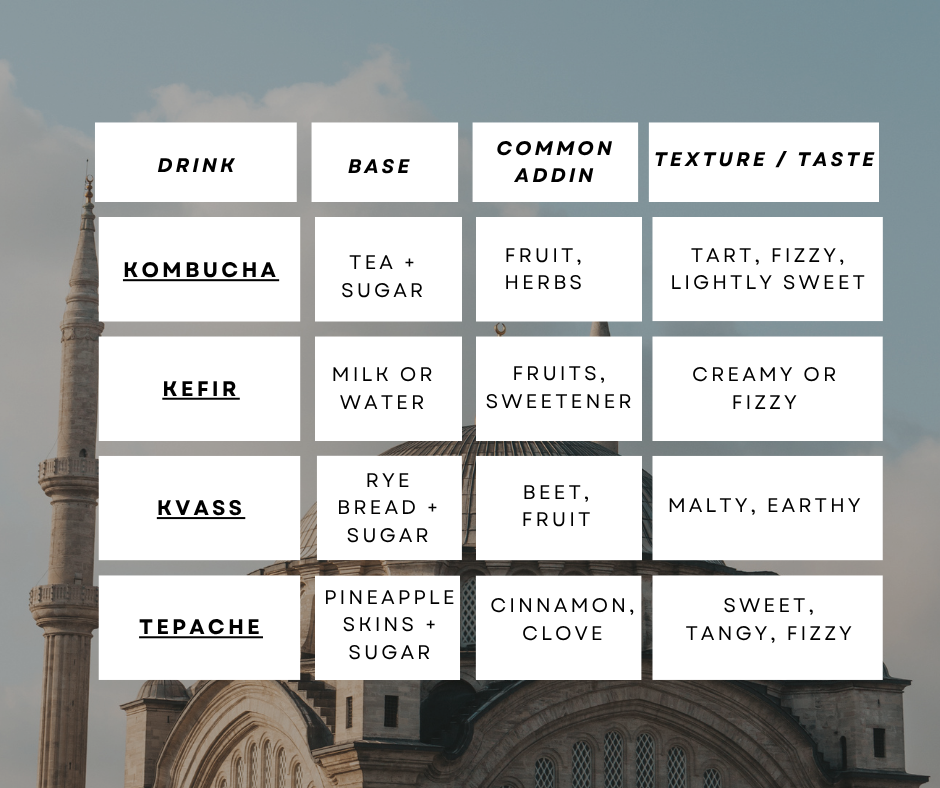What’s the Deal With Fermented Drinks?
From kombucha to kimchi to kefir — fermented foods are having a moment. But the truth is, they’ve been here all along. Fermentation is one of the oldest food traditions in human history, and when it comes to drinks, it’s both delicious and fascinating. So what’s the deal with drinks that bubble, fizz, and get better with age? Let’s dig in.
What Is Fermentation, Really?
Fermentation is a natural process where microorganisms — mainly bacteria and yeast — break down sugars into acids, gases, or alcohol. It’s been used for thousands of years to preserve food, create complex flavours, and develop beneficial compounds. You’ve probably already enjoyed fermented food without realising it: bread, cheese, yoghurt, miso, wine, beer, pickles. Even chocolate and coffee involve fermentation steps. [BBC Good Food Overview](https://www.bbcgoodfood.com/howto/guide/health-benefits-kombucha)
Why People Have Been Drinking Fermented Stuff for Ages
Long before refrigeration, fermentation was how communities kept food and drink safe. Ancient Egyptians brewed beer. Koreans fermented kimchi. Africans made palm wine. In many places, fermented drinks were actually safer to consume than water. They weren’t just functional — they were flavourful. Fermented drinks evolve over time, develop personality, and often carry the mark of the people who made them.
Fermented Drinks Today: From Fad to Culture
In the last decade, fermentation has made a comeback — this time with more marketing and better packaging. As conversations around gut health, probiotics, and functional foods picked up, drinks like kombucha and kefir entered the spotlight. But here’s the thing — not all fermented drinks are created equal. Some are pasteurised (killing off the good stuff). Some are diluted with juice or sweeteners. Traditional kombucha, like Booch, is raw, living, and actually fermented — not just fizzy tea in disguise.
What Makes Booch (the Drink) Special?
We brew in small batches with green and black tea, raw cane sugar, and SCOBY (Symbiotic Culture of Bacteria and Yeast). That culture converts the sugar into beneficial acids and carbon dioxide — giving Booch its signature tang and fizz. We keep it raw and free from fake flavours, and use only real fruit or herbs and let it condition. The result? Booch is bright, bold, clean, and unmistakably fermented — in the best possible way.
Kombucha vs. Other Fermented Drinks
Here’s how kombucha stacks up with other fermented favourites:
Kombucha has an edge — it’s versatile. It can be sipped solo, paired with food, or mixed into mocktails. And unlike milk-based ferments, it’s plant-based and clean on the palate.
Why Fermentation Is an Art (Not Just a Trend)
Real fermentation isn’t a plug-and-play operation. It’s alive. It changes with temperature, time, and ingredients. That’s why it requires constant attention, care, and craft. It’s more like sourdough than soda. At Booch, we check every batch, track every ferment, and bottle by hand. No shortcuts, no machines doing it all — just people who actually care about what’s inside the bottl
Why We Fell in Love With It
Brewing Booch isn’t just a job — it’s a ritual. A relationship with microbes, time, temperature, and taste. It’s knowing that every bottle tells a story: of patience, precision, and flavour that can’t be faked. Fermentation is a living process — and we’re just here to guide it.
Fancy trying a fermented drink that’s bubbly, balanced and super refreshing?
Try Booch. It’s brewed with love and purpose, with your gut and taste buds in mind.
Order online or visit us at Ripe Market this weekend.
Sources & Further Reading
- https://www.bbcgoodfood.com/howto/guide/health-benefits-kombucha
- https://www.bonappetit.com/story/what-is-fermentation
- https://www.sciencefocus.com/the-human-body/fermented-foods-gut-health/





